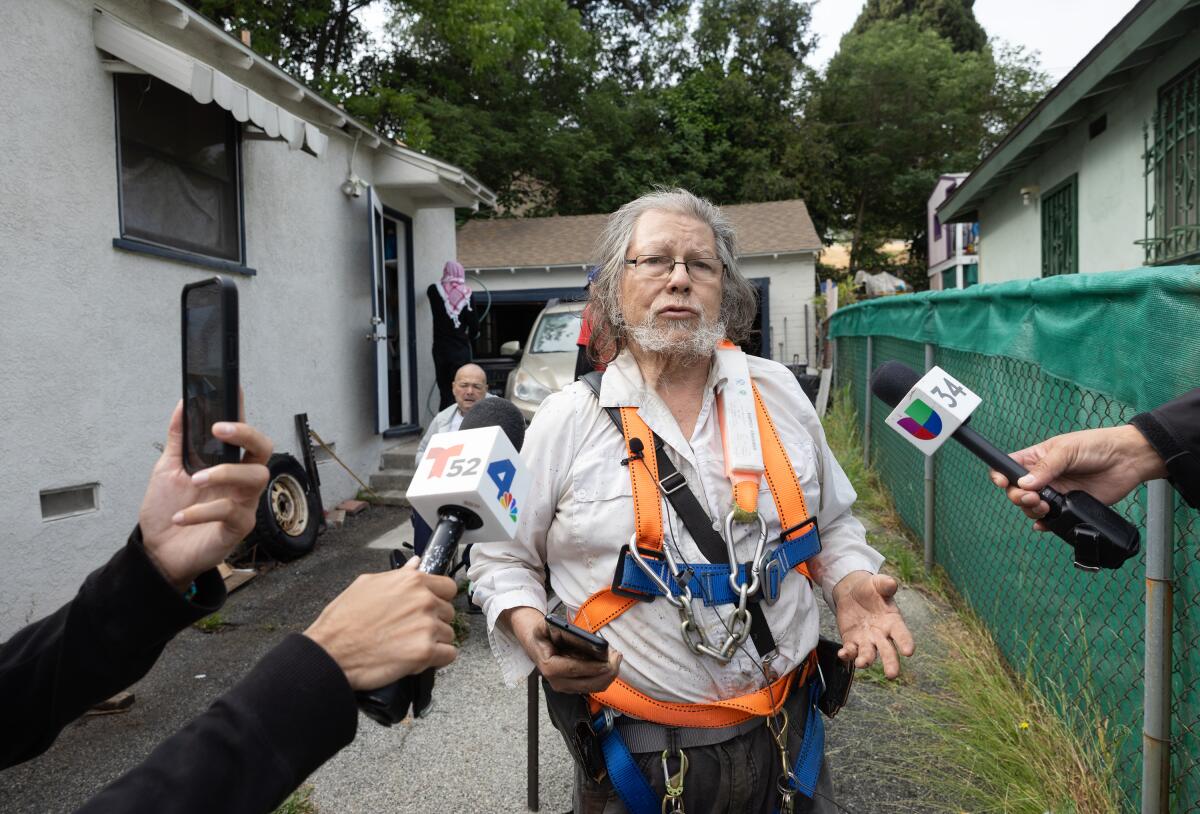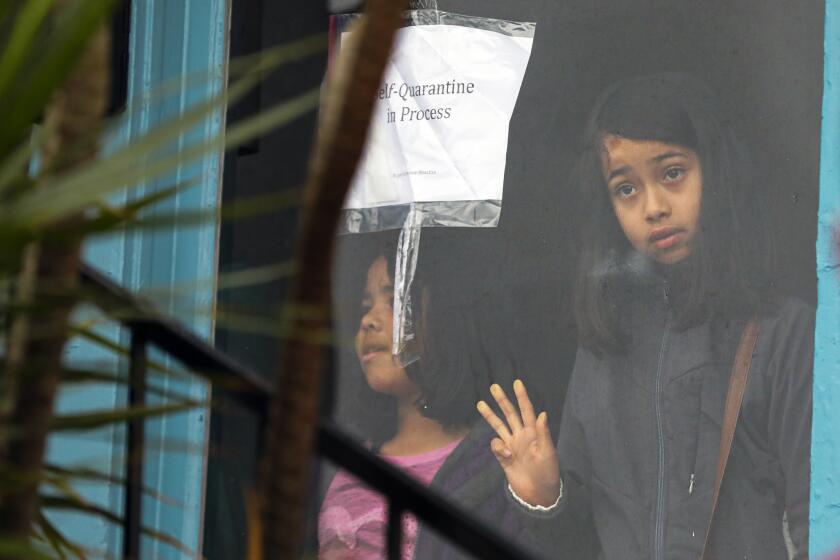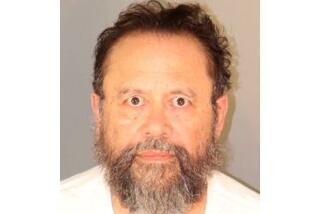Housing activist who ‘reclaimed’ state-owned home dies amid eviction protest

- Share via
- Benito Flores seized a vacant, publicly owned property in El Sereno, resisting years of government attempts to evict him
- Flores died last week after apparently falling out of a tree house he built in the back of the home he hoped to keep
When Benito Flores chose to resist his eviction from a state-owned home, he knew very well the decision might lead to his death. The 70-year-old retired welder preferred that outcome to becoming homeless again, suffering his last days on the streets.
Ultimately, he didn’t die without a home.
In March 2020, after 14 years of sleeping in a pale yellow van, Flores seized a vacant, publicly owned property in El Sereno. He acted in coordination with a dozen others who took homes for themselves. They argued that the true crime was not breaking into empty houses, but rather that the homes, acquired by the California Department of Transportation decades ago for a failed freeway expansion, were left to rot while tens of thousands of people in Los Angeles had no roof over their heads.
After more than five years living in a publicly owned, previously vacant duplex, Benito Flores faced down an eviction attempt Tuesday.
Flores and the others called their group “Reclaiming Our Homes.” Galvanized by national interest in their protest, they won permission from the state to remain temporarily in the properties. As time passed, other “Reclaimers” accepted settlements to leave or departed when Los Angeles County sheriff’s deputies came to the door. Flores built an elaborate, 6-foot by 3-foot tree house, 28 feet high in an ash tree in the backyard, preparing to climb up there when deputies arrived.
The risks were clear to him. He believed the alternative was worse.
“I am 70 years old with uncontrolled diabetes, I have sores on my feet and could lose them,” Flores wrote in a July 4 letter to the L.A. County Superior Court judge who ordered his eviction. “I am a strong candidate to die on the street alone and forgotten. That is why I choose to die here defending my house.”
Six weeks ago, Flores and a group of supporters succeeded in chasing off sheriff’s deputies who had come to remove him — without Flores having to barricade himself in the tree house. Ever since, Flores continued to fortify his defenses. He attached ladders to a second backyard tree in an attempt to create a web of protection in the sky.
Sometime last week, Flores apparently fell from the tree. A neighbor discovered Flores’ body Friday afternoon on the ground, his safety harness broken in the branches high above him. Paramedics pronounced him dead at the scene. The L.A. County medical examiner has yet to release further details.
Fearing the coronavirus outbreak and inspired by a similar occupation in Oakland, homeless residents moved into an El Sereno home owned by Caltrans.
It didn’t have to end like this, government authorities say. Officials with the Housing Authority of the City of Los Angeles, which was operating the temporary lease program on Caltrans’ behalf, have said they made every possible attempt to find him another place to live. They offered a cash settlement of up to $20,000, a Section 8 voucher and more than two dozen referrals to other homes.
But Flores rejected these as insufficient guarantees of permanent housing at a price he could afford on his sole source of income, Social Security and disability benefits. Caltrans planned to sell the small home where Flores built the backyard tree house to a nonprofit that would, in turn, allow a low-income resident to live there. He qualified, he reasoned, so why should he leave?
“Benito was the heart and soul of our movement,” said Roberto Flores, who operates a private community center in El Sereno and helped organize the five years of protests. Roberto Flores, who is unrelated to Benito, called him a martyr for the cause of housing and human rights.
Benito Flores was short and slightly stocky. He wore thin glasses, a wispy gray beard, old work clothes and frequently a bucket hat when he was in the sun. Friends were unsure if he had any immediate survivors.
Flores told The Times in May that he was born outside Monterrey, Mexico, came to the United States in the late 1980s, and later became a U.S. citizen. He said he worked on construction sites that required him to scale heights to secure steel beams.
As he aged and work dried up, he said, he needed to resort to living in his van. He kept the same battered vehicle parked on the narrow El Sereno street where he lived.
Soon after Flores was discovered Friday afternoon, activists organized a vigil at his home. The medical examiner had yet to come and Flores’ body remained in the backyard where it had been found, covered with a white sheet.

Around 50 mourners attended, honoring Flores with an Indigenous ceremony. They sang, recited prayers, played drums and lit fragrant copal and cedar, the smoke surrounding Flores’ body. At the end, they placed flowers on top of the sheet.
Some of those who gathered spoke. Gerardo Santos said he’d never met anyone before Flores who truly had given their life to a cause.
“We’re seeing a loss, something that’s very hurtful and painful,” Santos said. “And then we’re also seeing someone who died for what they believe in.”
After the medical examiner arrived, the tribute moved to the front of the home. Son jarocho folk musicians played in Flores’ honor behind a sidewalk altar with candles and a photo of a smiling Flores up in the tree.
About a dozen Los Angeles Police Department officers were there, which upset many in the crowd who said they were simply trying to pay their respects. LAPD Sgt. David Azevedo said they’d come because of the size of the gathering at the request of medical examiner personnel, who were concerned about their own safety. Besides, Azevedo said, legally the property should be in possession of the housing authority and no one should be there without the agency’s permission.
Some of the Reclaimers have accepted the housing authority’s assistance and remain in permanent low-income housing. Others received buyouts but have returned to homelessness. Two besides Flores who declined the settlements were locked out.
Los Angeles County Superior Court judges in recent weeks have ordered three activists who seized vacant, publicly owned homes in 2020 to leave. Some plan to keep resisting eviction.
Shortly after the failed eviction attempt of Flores last month, government officials approached him with one more offer: Four years of living rent free in an apartment in El Sereno.
Flores thought about it, he told a San Gabriel Valley podcaster, in what’s believed to be his final interview, published July 15. But he said no. What about his fellow Reclaimers who were now on the streets? Shouldn’t they get the same deal? And after those four years, he would only be older, and more tired and weak. It would be worse, he said, to stare down homelessness then.

It’s not as if the tree house didn’t scare him. He’d had an accident previously when a pulley system failed and he fell four feet, and realized what would have happened to him if he’d been higher.
“My life is at risk,” Flores said on the podcast. “I ask myself, why? Why am I climbing trees? I should be in a house, enjoying my retirement — playing dominoes or whatever things a retired person does.”
But his resolve was greater than his fear. Flores said he believed the state had an obligation to house the homeless, elders, disabled and families with children. Attempting to evict him and other Reclaimers, he said, violated that principle.
“That,” Flores said, “is why I am fighting.”
More to Read
Sign up for Essential California
The most important California stories and recommendations in your inbox every morning.
You may occasionally receive promotional content from the Los Angeles Times.










